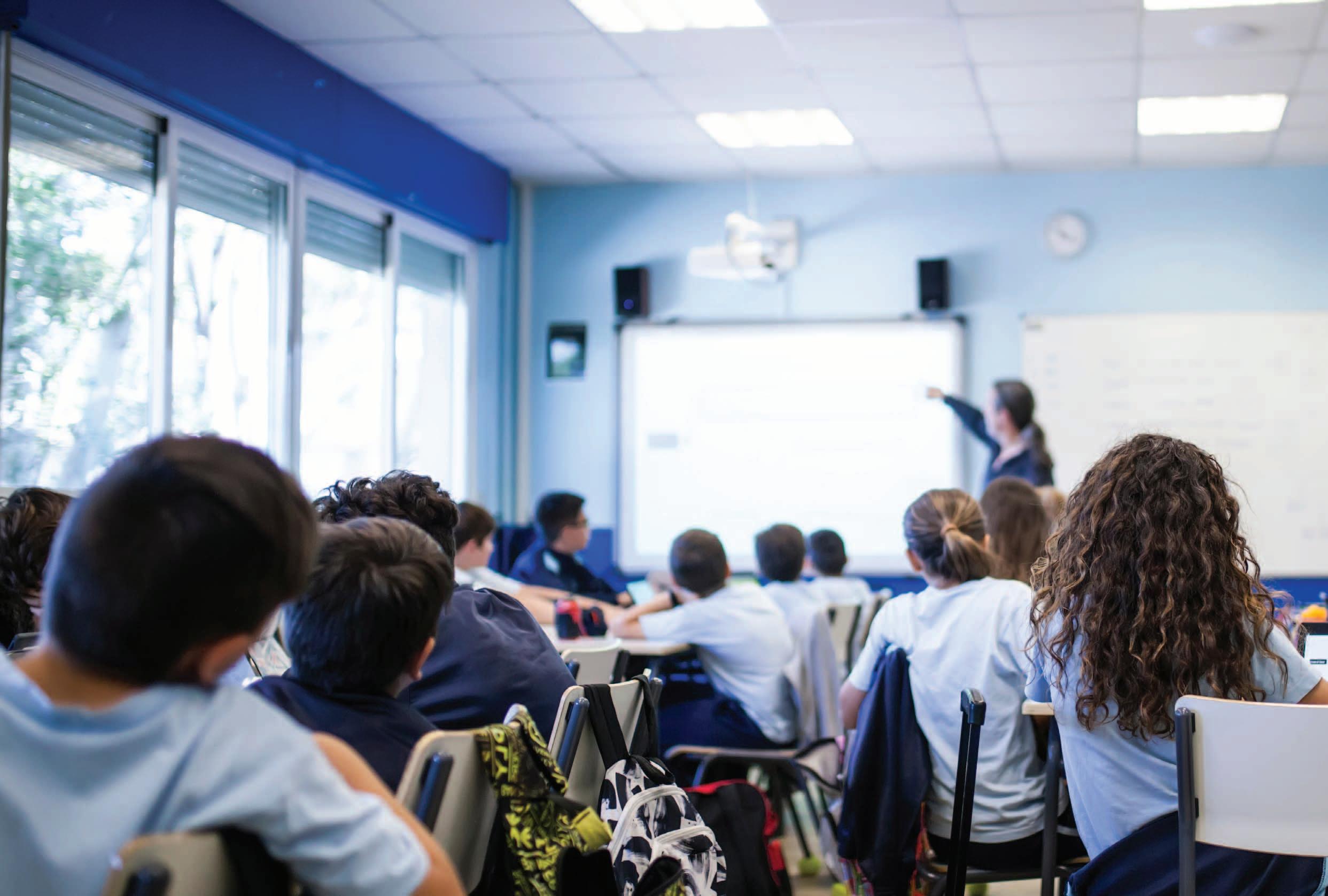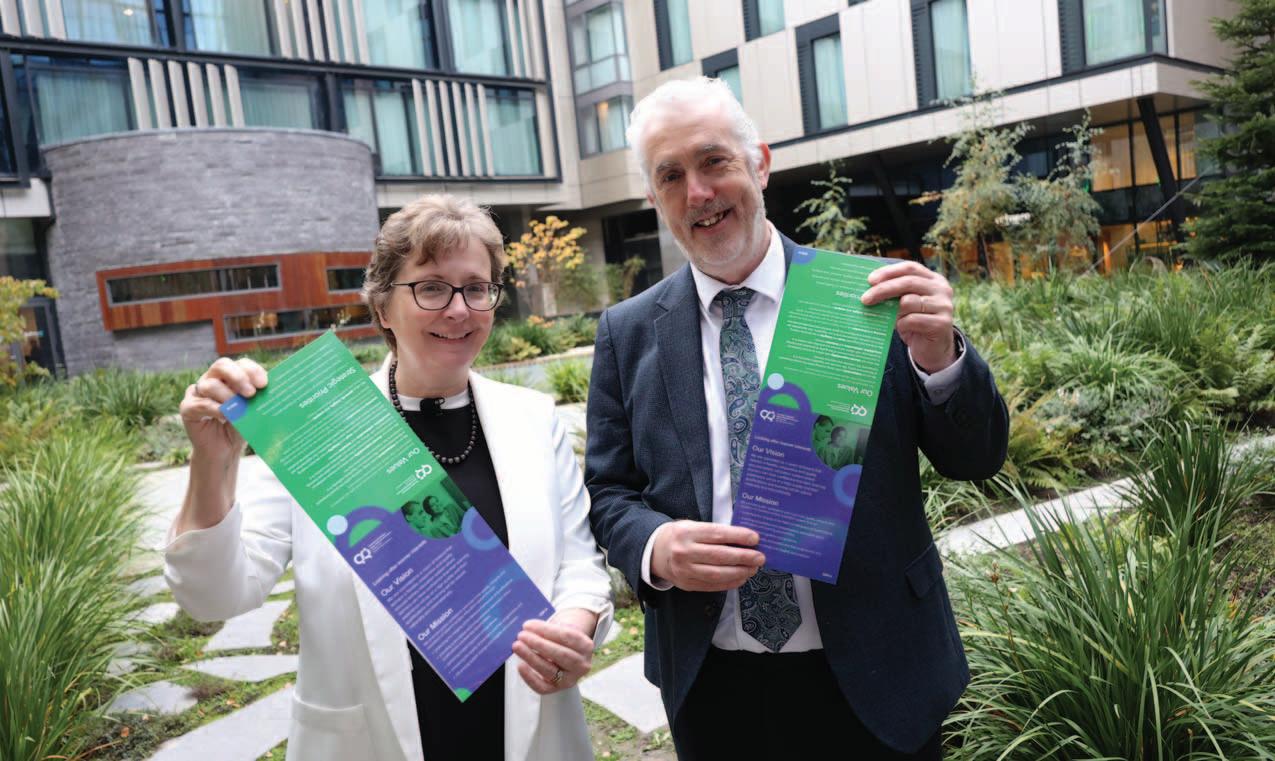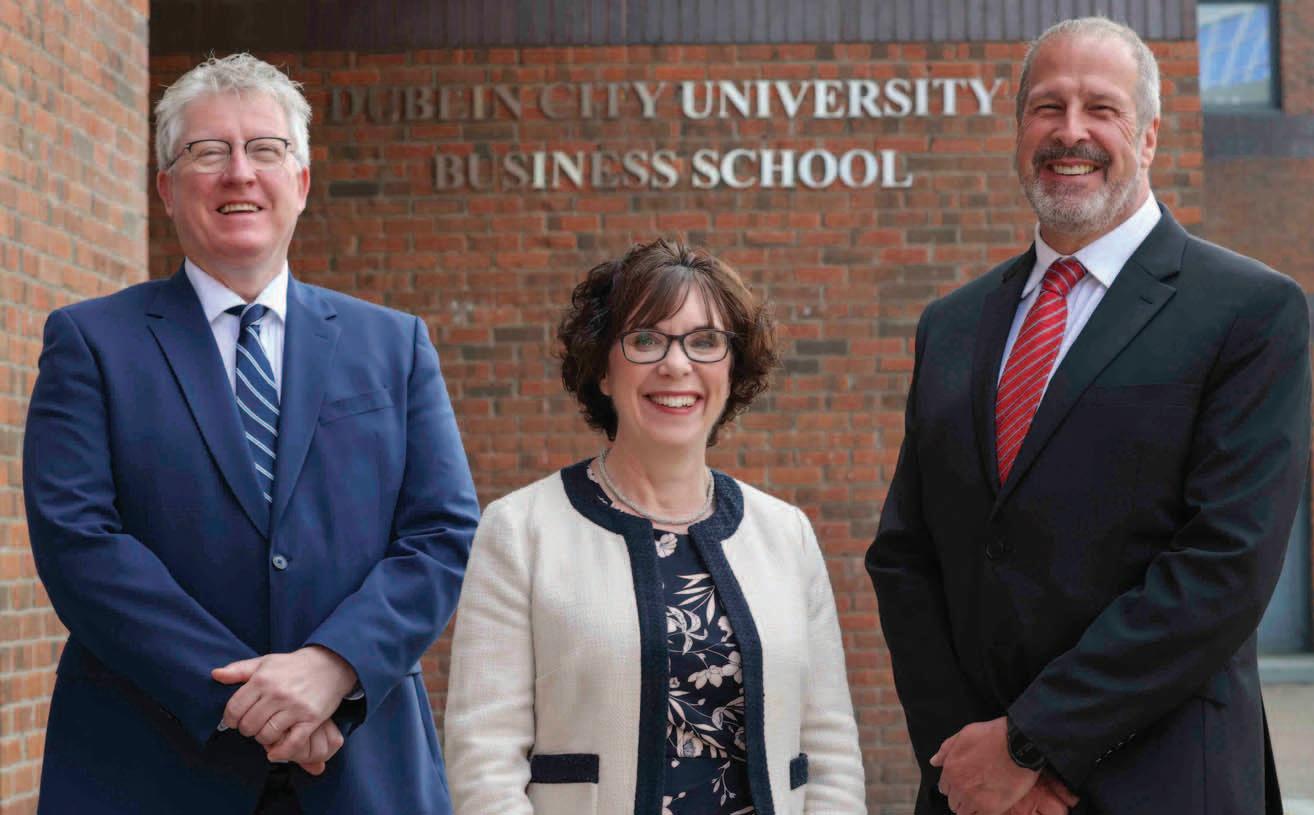Education report







Mairéad Pratschke, Professor and SALC Chair in Digital Education at the University of Manchester, examines the transformative potential of generative artificial intelligence (GAI) in educational settings, and outlines the four key phases of AI adoption.
As AI becomes an essential tool in industry, Pratschke argues for GAI literacy within educational institutions to ensure that both educators and students are adequately prepared for the future of work.
Pratschke divides the GAI literacy journey into distinct stages of user maturity, providing a roadmap for professional development and applications of GAI. These stages are not linear, but overlapping, and will not apply in all cases but they provide examples of GAI use in education.
The first stage of adoption, where GAI is primarily used to generate content, has already begun. AI tools are being employed to generate summaries of texts and to interact with content; and to assist with administrative tasks.
AI can be used as an assistive technology, to enhance accessibility, help students with learning challenges and disabilities, such as
speech-to-text transcription and assisting students with visual impairments. Importantly, AI can promote inclusivity, providing support for neurodivergent students and those with different learning needs, helping them access and engage with content in more accessible ways.
In the second stage, as users become more competent, they collaborate actively with the technology, creating their own AI tools and defining how they behave. Pratschke highlights the potential for such tools for active learning, where AI takes on the role of creative collaborator and working alongside students and educators in the learning process. Pratschke has conceptualised this design approach as ‘generativism’, which refers to the collaboration between humans and GAI, as well as generative learning theory. For example, GAI chatbots can now be used to assist students in research, take on the role of tutor, or as a partner in ideation.
The third stage in AI use involves the development of what Pratschke describes as “intelligent communities”, where humans and AI systems work together in teams or communities of humans and AI experts. In education, this could mean that AI takes on roles such as a peer, mentor, or guide, helping learners navigate complex subject matter, or as a co-researcher or co-instructor that supports and works alongside academics. Pratschke emphasises that GAI tools can take on multiple roles within the classroom, ranging from tutor to facilitator to coinstructor. For instance, AIs can simulate real-world scenarios, offering students opportunities to practice difficult conversations, such as interviews or negotiations.
This capability, she says, is particularly beneficial for skill-based training, such as language learning, public speaking, or conflict resolution. By using GAI tools in varied roles, educational institutions can leverage its capabilities to offer richer, more varied learning experiences that would be difficult to achieve with traditional methods alone.

In the education sector, the transition from using AI to simply generate content to using it as a learning partner is becoming increasingly important, as the educator moves from being a passive consumer of GAI output to an active collaborator and designer of the tool itself. Pratschke notes that early experiments have shown that when AI is used as a co-instructor in classrooms, it can – when properly designed – enhance student engagement and improve learning outcomes. Similarly, the use of GAI tools for student support have also been shown to increase student satisfaction, by providing 24hour support and answering questions.
AI has the potential to facilitate a more personalised approach to learning that tailors educational content to a student’s pace and needs. Using data analytics, AI can identify gaps in knowledge and provide adaptive content targeted to address these gaps, which allows for a level of 1:1 help which would be difficult for an instructor in a traditional classroom setup to achieve.
This approach aligns with the growing emphasis on lifelong learning, as it allows learners to progress at their own speed, ensuring that education is not just one-sizefits-all but rather responsive to individual needs.
On ensuring AI literacy among educators, Pratschke states that, as AI technologies continue to evolve, the workforce must develop the skills necessary to interact effectively with AI systems. She argues that AI literacy should be a core component of teacher training, and
that educators must not only learn how to use AI tools but also understand how AI models work and how to teach students to collaborate with AI. This includes teaching students how to use AI ethically, how to interact with AI in productive ways, and how to critically evaluate AI-generated content.
Some predict that the role of the teacher will change as AI becomes more prevalent in the classroom. Teachers will no longer be the sole source of knowledge, but rather facilitators of learning, helping students navigate the vast resources available through AI and guiding them in using AI responsibly and creatively. This is the model of education that Pratschke describes as the “new hybrid”.
Concluding, Pratschke reiterates that AI presents both challenges and opportunities for the Irish education sector. While AI has the potential to support student learning, she says that it also requires careful integration into educational practices.
Pratschke urges policymakers, educators, and industry leaders to collaborate in preparing the next generation of learners for a future where AI is a central part of everyday life. By fostering AI literacy, investing in professional development for educators, and with the careful design of tools for use in intelligent communities, she says that Ireland can lead the way in ensuring that AI serves as a tool for empowerment of educators, rather than the automation of education.

Philip Connolly, Director of Services with Student Universal Support Ireland (SUSI) tells eolas Magazine how SUSI is evolving through a period of sustainability and future proofing and outlines its five-year strategic plan which places the student at its core.
SUSI is Ireland’s national awarding authority for further and higher education grants. A business unit of City of Dublin ETB, SUSI administers student funding in line with legislation set out by the Department for Further and Higher Education, Research, Innovation and Science (DFHERIS) in the Student Support Act 2011 and annual Student Grant Schemes and Student Support Regulations.
Established in 2012 to replace 66 regional awarding authorities, SUSI created for the first time a single, centralised awarding authority for student funding in Ireland. SUSI’s mission is to empower students to transform their lives through tertiary education and between 2012 and 2024, SUSI processed over 1.26 million applications, awarded over 960,000 grants to students and paid almost €3.8 billion in funding.
In recent years, as well as implementing the most legislative changes in over a decade, SUSI’s remit expanded beyond the Student Grant Scheme. In 2024 the Student Part-Time Fee Scheme for Specified Undergraduate Courses was launched providing, for the first time, funding for students
studying part-time. SUSI administers the PLC Bursary for Displaced Persons Ukraine Scheme and the International Protection Student Scheme. In addition, SUSI provides assistance to the higher education institutions in delivering the 1916 Bursary and processes applications for funding for tertiary education programmes. SUSI is also the paying authority for DFHERIS scholarships and bursaries including the All-Ireland Scholarship.
“We are committed to delivering continuous service improvements to our students,” says Connolly. “Over the last 12 years, we have enhanced our service by developing an online application portal, creating a centralised system for the swift and consistent assessment of grant applications, launching new and responsive communications channels and implementing a scalable workflow model that reflects the seasonal nature of the application process.”
He continues: “We are now moving to a period of sustainability and future proofing. We aspire to be a leading public service which places the customer at the centre of everything we do



through building an agile organisation and harnessing cutting-edge digital systems. To support this and falling under the wider City of Dublin ETB strategic plan, we have developed a five-year strategic plan specific to the remit of SUSI as a grant awarding authority.”
Built upon the foundation of being a data driven organisation, SUSI’s strategy is anchored in three pillars. “Each pillar is underpinned by a set of strategic goals which form the bridge between the pillars and a set of practical initiatives that result in the organisation’s annual business plan,” adds Connolly.
SUSI aims to always respond to student and customer needs.
• Goal one – Further develop SUSI as a student and customer centred organisation: This goal will be achieved by embedding a customer service mindset within the organisation; considering the customer in everything SUSI does and taking the organisation from customer service to customer experience.
• Goal two – Understand our customer: This goal will be realised by engaging with customers to understand their needs and track their sentiment and satisfaction with SUSI services. Mapping customer journeys and identifying barriers to customer engagement will further drive this goal.
• Goal three – Create an excellent customer experience: Delivering transparent, proactive two-way communications; using digital channels and solutions; making the application process as easy as possible and creating a consistent experience no matter where the customer meets the organisation will support this goal.
To further enhance the service, SUSI aims to leverage digital technology to proactively lead the continuing advances required across its processes at a time of change and development.
• Goal one – Become a digital by default organisation: While ensuring services are delivered in an equitable, inclusive and sustainable manner, this goal will be achieved by delivering digital processes for all aspects of service provision as well as using digital to improve the experience for those engaging with the service offline when needed.
• Goal two – Digital transformation: To be achieved by implementing interoperable and scalable technology based solutions; adopting a set of architecture principles as a set of building blocks that compose of technology, data, security and governance; designing and building systems that are aligned with best practice in security and cyber defence and investing in integrated and scalable digital infrastructure
• Goal three – Harness data effectively: This will be accomplished by recognising data as a key strategic asset; safeguarding and growing data sharing partnerships and protecting data.
SUSI aims to fully engage its staff to ensure an agile and model public service workplace.
• Goal one – Design an optimal organisation: This will be achieved by promoting mobility, progression and role clarity.
• Goal two – Create a model workplace: This will be achieved through workplace innovation, a focus on diversity, inclusion and accessibility and professional development.
• Goal three – Create a vibrant and welldefined culture: This will be achieved by fostering positive workplace relations, identifying organisation values and further building interdepartmental communications.
Progress on the goals and initiatives outlined in the strategy will be reviewed and monitored at scheduled intervals throughout its lifetime.
Connolly concludes: “Our commitment to our students is stronger than ever. Work has already begun across all three strategic pillars and we look forward to building on this further in the years to come.”
Student Support Desk
T: 0818 888 777
E: support@susi.ie
W: www.susi.ie

More time will be given to teaching languages, STEM subjects, and wellbeing under the first major revamp of the State’s primary school curriculum in 25 years.
The redeveloped primary curriculum introduces a range of new learning areas and subjects, aimed at giving greater flexibility to schools and teachers to adapt learning to better meet pupil needs.
The National Council of Curriculum and Assessment (NCCA) is leading the development of five new curriculum areas, the specifications for which are set to be introduced from September 2025 and implemented on a phased basis. These include:
• language (updated to include modern foreign languages in third class to sixth class);
• science, technology, engineering and mathematics (STEM) education;
• wellbeing;
• arts education; and
• social and environmental education (history and geography).
Consultation on the draft primary curriculum specifications closed on 7 June 2024, following the publication of the primary curriculum framework in March 2023. The framework has been developed by the NCCA over a six-year period.
The previous primary curriculum had been in place since 1999 and has been credited with improved attainment levels in reading, maths and science, however, longstanding challenges to modernise how assessment is used to inform learning and teaching, as well as the emergence of greater volumes of research on children‘s learning and development, and the role of technology and the internet, had prompted moves to reform the curriculum.
The Primary Curriculum Framework connects with the Framework for Junior Cycle, aimed at

“supporting continuity of experiences for children from early childhood through primary school and into their post-primary education”.
In November 2024, then-Education Minister Norma Foley TD announced €9 million was to be provided for school resources and materials for the new primary curriculum, specifically aimed at supporting the STEM and Arts curriculum areas.
The Minister said that the investment is part of a longer-term strategy to ensure sustained support for schools: “Over the coming years, we will continue to allocate resources to support our schools in implementing the curriculum. This will be a multi-annual funding initiative, with future allocations depending on budgetary considerations and emerging needs as we roll out the curriculum nationwide.
“We are committed to ensuring that every school, has the tools and resources necessary to deliver high-quality education for all their pupils. By planning for the long term, we can adapt to the evolving needs of schools and ensure continuous improvements in learning and teaching across the country.”
Some elements of the primary curriculum reform have already been initiated. The new primary mathematics curriculum, situated within the STEM curriculum area, was published in September 2023. The Department of Education says that while much of ‘what’ children will learn remains unchanged, greater emphasis is placed on enhancing ‘how’ children learn mathematics best.
“The new curriculum sets out a fresh vision for children’s learning that is characterised by playfulness, creativity, challenge, risk-taking, and opportunities for reasoning and solving real-life problems,” it states.
Previously, Curaclam Teanga na Bunscoile was introduced for all stages in primary school in 2019. Under the Primary Curriculum Framework, the Curaclam Teanga na Bunscoile will be updated to reflect the introduction of modern foreign languages at primary level, and will be introduced into schools in the 2025/2026 school year.
Speaking before the Joint Committee on Education, Further and Higher Education, Research, Innovation and Science on 5 November 2024, Chief Executive of the NCCA, Arlene Forster described the publication of the primary curriculum framework for primary and special schools as a “significant milestone”.
Describing the framework, she says: “The framework sets out the curriculum areas and the subjects of the curriculum. It introduces and expands on aspects of learning.
“It also gives an increased emphasis to existing areas such as physical education, social, personal and health education and digital learning, and provides for greater agency and flexibility for teachers and children. Importantly, the framework also links with learning experiences provided through Aistear, the early childhood curriculum framework, and connects with learning in the framework for the junior cycle.”
Areas of contention centre around how sexual education will be taught, the amount of time given to religion, and a potential reduction of time allocated to teaching the Irish language.
Addressing concerns that the new primary curriculum will see a reduction in the average time spent on the Irish language, the NCCA says that in English-medium schools the time for Irish language learning will remain unchanged for junior and senior infants, however, for first to sixth class, a reduction of 30 minutes per week is planned. The NCCA says that the change is in response to feedback from teachers for a restoration of flexible time into the curriculum and a desire from children for more time on physical education, and social, personal and health education (SPHE).


Quality and Qualifications Ireland (QQI)’s role in education is to promote confidence and trust in the quality and reputation of Ireland’s tertiary education system.
Our work on the National Framework of Qualifications (NFQ) and on qualifications connects further and higher education and English language education, involving public and private/independent providers, so learners can access and experience these as part of a seamless integrated tertiary education system. In 20252027, QQI will address new challenges in areas such as assessment, workintegrated learning; online learning; apprenticeships new and traditional; climate change, and equality, diversity and inclusion.
QQI’s vision is to create a flexible, responsive, and high-quality tertiary education system where learners have confidence that their learning experience is of a high quality and that
their learning and qualifications are valued nationally and internationally. We will continue to look after learners’ interests, focus on quality outcomes for learners and the recognition, at home and abroad, of the learning and qualifications achieved by all who participate in Ireland’s tertiary education system.
Our strategy is underpinned by values of collaboration, trust, integrity, learning and innovation. These values are critical to how we work and to our success. We collaborate with our stakeholders –with learner representatives, institutions and providers, government departments and the funding agencies, professional and regulatory bodies and international peer agencies. We consult and engage widely and meaningfully with our
stakeholders and partners so that we anticipate needs, innovate and deliver excellent service. We place significant value on the responsibility we share with others to maintain the confidence in and continued enhancement of the quality of Ireland’s tertiary education and training. At the same time, we regulate independently, fairly, and robustly.
The strategy for 2025-2027 has elements of continuity, such as creating a more dynamic qualifications system, higher quality and more comprehensive information to learners. The renewed commitment to strengthen and futureproof the NFQ and access, transfer and progression, which will better serve learners across all of education –learners in our schools, further, higher
and English language sectors. The strategy has new elements too, namely that QQI will award the TrustEd Ireland quality mark to higher education and English language education providers who meet the relevant standards. This will ensure that international learners enrolled on higher education and English language education programmes in Ireland, receive highquality education and qualifications that are respected and recognised worldwide.
Launching QQI’s fifth statement of strategy on 21 November 2024 at QQI’s biennial conference ‘Leading and learning in a changing landscape’, Keith Moynes (Assistant Secretary, Department of Further and Higher Education, Research, Innovation and Science) described it as “succinct, comprehensive and detailed”, setting out “a clear vision and mission for the future” with “actions that are both ambitious and achievable”.
We will further develop our platforms to promote the NFQ as the authoritative source of information on qualityassured qualifications, including microcredentials. We will review and modify the NFQ award types and improve choice through the recognition of listed awarding bodies and the inclusion of academic and professional awards in the framework. We will also develop an authoritative list of English language education and higher education programmes offered to international learners by providers who have achieved the TrustEd Ireland quality mark.
We will continue to provide authoritative information about the quality of the public tertiary education system through a comprehensive monitoring framework. We will engage with further and higher education providers to develop appropriate models for future institutional quality review, while updating assessment guidelines to reflect changing teaching and learning contexts. We will seek to increase autonomy and flexibility for mature private higher education providers while ensuring oversight of quality and will

devolve more responsibility for programme validation to education and training boards so that they are better able to develop flexible and innovative programmes. We will develop quality assurance guidelines for a single system of apprenticeship, for workintegrated learning and for programmes that span the tertiary education sector. Finally, through the services of NARIC Ireland, we will enable greater understanding of overseas qualifications by providers, employers, and international learners, including displaced persons and refugees.
We will improve our data analytics capacity to create QQI dashboards offering systems-level indicators on quality and qualifications and share guidance and thought-leadership with providers in assessment and artificial intelligence. We will inform providers, policy makers, and state agencies about insights and trends. We will also work to maximise the impact of our research and analysis through effective communications.
Through our relationships with state agencies, providers and other stakeholders, we will inform and influence education and training policy, and through our work with a diversity of learner representative and advocacy bodies, we will help develop mechanisms to effectively engage learners in the quality of their education and training. We will support capacity-
building in the education and training boards by partnering strategically with funding authorities, provider representative bodies and other stakeholders. We will collaborate with provider and learner representative bodies to fully integrate the English language education sector within QQI’s regulatory and quality assurance frameworks.
We will create a diverse and inclusive workplace, with a culture that values equality, diversity and inclusion (EDI), and operates effectively in a technology-enabled hybrid working environment consistent with our climate and sustainability obligations. We will nurture a culture of cross-organisational knowledge-sharing, communication and project management to enhance organisational agility and resilience. We will improve our services through usercentred design of information and communications technologies, business processes and platforms. We will also explore the potential offered by artificial intelligence, in line with the guidance for its use in the Irish public service.
Our new strategy is ambitious, yet achievable. It will enable QQI, through close collaboration and coordinated action with partners and stakeholders, to enhance the Irish tertiary education and training system in ways that empower it to anticipate the needs, innovate the solutions, and deliver the transformations we need to make the future a better one for us all.
W: www.qqi.ie


While Irish students often outperform those from other parts of the world in literacy, mathematics, and science, the State continues to grapple with deep-seated inequalities, particularly for students from disadvantaged backgrounds and minority communities, research by the OECD finds.
Ireland’s education system has garnered international acclaim for its strong performance in literacy, mathematics, and science. However, challenges persist, particularly in addressing inequalities for socio-economically disadvantaged students, as highlighted by two 2024 OECD reports.
Education at a Glance 2024 and the OECD Review of Resourcing Schools to Address Education Disadvantage in Ireland explore these issues in depth, offering a comprehensive overview of Ireland’s strengths, shortcomings, and opportunities for fostering equity.
Ireland’s achievements in education are notable. According to Education at a Glance 2024, tertiary attainment among adults aged between 25 and 64 reached 54 per cent in 2022, well above the OECD average of 40 per cent. Similarly, the share of young adults without upper secondary qualifications has dropped significantly, standing at
5 per cent, far below the OECD average of 14 per cent.
However, Education at a Glance 2024 also underscores persistent inequalities, particularly for students from Traveller and Roma communities and those living in areas of concentrated disadvantage.
Gender disparities compound these challenges. Women dominate in tertiary education, yet young men outperform them in early school leaving metrics. Meanwhile, regional differences such as lower secondary enrolment rates in the Eastern and Midland regions highlight the uneven distribution of educational opportunities.
The OECD Review of Resourcing Schools to Address Education Disadvantage in Ireland provides an in-depth evaluation of the Delivering Equality of Opportunity in Schools (DEIS) programme, Ireland’s primary strategy for addressing educational
disadvantage. Launched in 2005, DEIS now supports nearly 30 per cent of Irish schools with additional resources, including smaller class sizes, enhanced school meal programmes, and targeted literacy and numeracy interventions.
While the programme has narrowed achievement gaps, challenges remain. The OECD Review of Resourcing Schools to Address Education Disadvantage in Ireland highlights the rigidity of DEIS eligibility thresholds, which leave some schools and students without support despite clear needs. Additionally, the report emphasises the demand for a “DEIS Plus” category to address the “acute challenges faced by schools serving the most disadvantaged communities”.
Ireland’s baseline school funding ensures relative parity, but additional costs, such as voluntary contributions, often fall on parents. According to Education at a Glance 2024, non-DEIS schools are far more likely to rely on these contributions, placing an undue burden on lower-income families. Furthermore, staff shortages disproportionately affect disadvantaged schools, with the OECD Review of Resourcing Schools to Address Education Disadvantage in Ireland identifying teacher retention and recruitment as critical issues.
The OECD Review of Resourcing Schools to Address Education Disadvantage in Ireland also critiques the use of the Pobal Haase Pratschke (HP) Index for allocating DEIS resources. While scientifically validated, the index omits variables like immigrant and minority status, potentially excluding high-need students. The OECD Review of Resourcing Schools to Address Education Disadvantage in Ireland recommends refining these indicators and adopting a more dynamic approach to resource allocation to better address the diverse needs of Ireland’s schools.
Early childhood education and care (ECEC) is vital for reducing developmental gaps, yet Education at a Glance 2024 points to stark disparities in access. Participation rates for children from low-income families are far below those of wealthier peers – 7 per cent versus 54 per cent.
Furthermore, Ireland has one of the longest “childcare gaps” among OECD countries, with free early education starting five years after paid parental leave ends. Bridging this gap is critical for levelling the playing field and ensuring long-term equity.
The OECD Review of Resourcing Schools to Address Education Disadvantage in Ireland commends Ireland for its professional development initiatives within DEIS schools but identifies systemic challenges affecting teacher capacity, including staff shortages and a lack of diversity in the teaching workforce. Embedding professional development within a structured improvement cycle and reducing barriers to participation could, the OECD argues, address these gaps.
OECD Review of Resourcing Schools to Address Education Disadvantage in Ireland also highlights the importance of fostering collaboration and peer learning among teachers, stating that initiatives such as the State’s new support service, Oide, show promise in facilitating knowledge sharing and capacity building. However, the OECD states that further investment is needed to embed these practices across all schools.
Educational disadvantage is often intertwined with broader social challenges, such as housing insecurity and mental health challenges. The OECD Review of Resourcing Schools to Address Education Disadvantage in Ireland underscores the need for stronger coordination between Ireland’s education, health, and social services sectors. As such, the OECD says that schools frequently shoulder the burden of navigating fragmented systems, diverting time and resources from their core mission.
For example, long waiting times for psychological assessments and limited access to therapeutic services “disproportionately impact disadvantaged schools”. The OECD therefore argues that improved interagency collaboration would alleviate these pressures and enable a more holistic approach to student wellbeing.
As highlighted by both OECD reviews, Ireland’s education system is a general high-performer with some underlying challenges. While the DEIS programme demonstrates government’s commitment to addressing disadvantage, structural reforms are needed to unlock its full potential. Nevertheless, with targeted investments, refined policies, and strengthened collaboration, Ireland has an opportunity to lead globally in inclusive education.



Bunaíodh COGG in 2002, COGG is an aegis body under the Department of Education.
COGG’s remit includes: provision of textbooks, resources and services through Irish, funding and facilitation of research on all related matters and provision of advice and information to the Minister for Education and the National Council for Curriculum and Assessment on Irish medium education and the teaching of Irish.
While COGG has achieved much success over the past twenty years in providing textbooks, resources and services for schools in addition to facilitating the provision of a considerable corpus of research on Irish medium education and the teaching of Irish, we will concentrate for the purposes of this article on some specific projects currently in development.
This online digital platform is dedicated to the provision of multi-modal resources for teaching through Irish and the teaching of Irish at primary and postprimary levels. Resources are created by teachers for teachers. Over 2,500 resources are currently available on the platform. It is hoped to significantly increase the breath, range and number of resources across all subject areas in coming years.
Acmhainn chuimsitheach, chruthaitheach agus nuálach í Tairseach COGG. Cuirfear le líon na n-acmhainní de réir a chéile agus déanfar athbhreithniú rialta ar an tsoláthar atá uirthi.
In 2023, COGG facilitated the establishment of reading clubs in over 20 primary and post-primary schools on a pilot basis. The aim was to encourage and support reading in Irish for enjoyment and also to support the acquisition of Irish for learners and native speakers to extend and enrich their linguistic skills.
Researchers from Mary Immaculate College of Education carried out research on the reading clubs in 2024 –research which is published on COGG’s website. The research highlights the effectiveness of the clubs in fostering interest in reading books in Irish. Over 50 schools are now involved in the scheme with a waiting list for 2025.

Is iomaí taca a chuirtear ar fáil do scoileanna atá rannpháirteach lena náirítear sraith leabhar i seánraí éagsúla, leabhair ghníomhaíochta, cuairteanna scoile ó údair na saothar mar aon le deontas chun dreasachtaí beaga a chur i bhfeidhm i riaradh na gClubanna Leabhar i scoileanna. Anuas air sin, cuirtear acmhainní breise tacaíochta (bileoga oibre, gluais agus póstaeir) ar fáil ar ardán thiomnaithe na heagraíochta, Tairseach COGG.
This project is a partnership between COGG, Lorraine Harbison (DCU) and Fighting Words. The focus is on teaching mathematics through stories in order to situate mathematics in real life situations. In the new Primary mathematics curriculum (Department of Education, 2023) there is a focus on playful methodologies as well as encouraging conversations about Mathematics, challenging cognitive tasks and formative assessment.
Is é aidhm an togra seo ná go rachadh na daltaí i dtaithí ar scéalta matamatice a chumadh le béim ar an gcruthaitheacht, ar an tsamhlaíocht agus ar an spraoi.
In co-operation with the Amber Institute in Trinity College, COGG has produced a series of videos highlighting, for children in senior classes in primary
school, the various careers associated with STEM.
Being able to speak Irish as well as English and other languages opens many doors for students and young people, both at home and abroad. To illustrate the many advantages having Irish confers on students and young people embarking on college courses or careers, COGG has developed an attractive and highly informative resource for guidance counsellors, Irish teachers and students.
Ní hamháin go dtugtar léargas cuimsitheach ar ghairmeacha éagsúla le Gaeilge san acmhainn seo ach roinntear sonraí luachmhara freisin faoin iliomad cúrsaí tríú leibhéil, deiseanna breisoideachais, printísigh, sparánachtaí, scoláireachtaí, deontais agus scéimeanna cónaithe.
Over the past 20 years, COGG has funded a considerable corpus of research in conjunction with many other third level institutions and researchers. In order to make this research more accessible for teachers and parents, Claire Dunne from Marino Insitute of Education has carried out a comprehensive analysis of the research leading to the publication of a guide for
schools and parents as well as the more complete analysis.
Tá obair shuntasach idir lámha ag COGG freisin i réimse riachtanais speisialta oideachais ag an mbunleibhéal agus ag an dara leibhéal.
During 2023, COGG and Education Support Centres Ireland (ESCI) collaborated to provide an Irish course in almost every education centre. The course designed by COGG focused on encouraging and supporting teachers to engage with the myriads of resources available, to explore innovative ways to teach Irish and engage pupils, and the effective use of technology for language learning. All 330 attending teachers received a resource pack to return for use in their schools.
Bailíodh aiseolas ó na múinteoirí agus léiríodh go raibh taithí thar a bheith dearfach acu. Thuairiscíodar níos mó muiníne i labhairt na Gaeilge, an luach a bhaineann le Gaeilge neamhfhoirmiúil a chur chun cinn ar fud na scoile agus feasacht ar na hacmhainní atá ar fáil do mhúineadh na Gaeilge.
W: www.cogg.ie
W: www.tairseachcogg.ie


The prevalence of ‘grinds’ reinforces educational inequality as it is used to avoid educational failure for lower-achieving young people from more advantaged families in the State, research by the Economic and Social Research Institute (ESRI) states.
Participation in shadow education, private supplementary tuition outside school (commonly referred to as ‘grinds’ in Ireland), has become increasingly common in many countries, with ongoing debates about its effects on academic performance.
The ESRI’s study, Participation in Shadow education and academic performance in Ireland and Germany, compares shadow education uptake and outcomes in the two system.
The analyses examine differences in grade point average between those taking shadow education and those not, taking account of other factors that might affect performance like social background.
In Germany, the findings show that shadow education can benefit low-achieving students by helping them maintain the grades needed to progress to the next year of school.
The study further states that in Ireland, grades matter for higher education entry, thus shadow education is used, particularly among low to medium achieving students, to enhance their chances of doing well, and securing the university place they want.
Consensus amongst several studies is that grinds benefit students from a socially advantaged socioeconomic background in Ireland, with the lowest achieving students in Ireland least likely to take-up grinds.
In addition, students from a migrant background are also less likely to engage in private tuition in Ireland, while the same gap does not exist in Germany, the ESRI asserts.
While there are some non-profit examples of shadow education in Ireland, the for-profit


market has an estimated value at €60 million at secondary level, according to Trinity News
In a 2022 ESRI study, Shadow Education uptake among final year students in Irish secondary schools: Wellbeing in a high stakes’ context, Selina McCoy and Delma Byrne state that students at the lowest end of educational performance scale, are least likely to take outof-school tuition.
They emphasise: Grinds are more common among pupils in fee-paying schools, and least likely among pupils in Deis schools serving disadvantaged communities,” as well as shadow education, having become “an accepted component of examination success for many students”.
The study indicates that the uptake of participation in grinds substantially higher in Ireland, with 55 per cent of Irish students taking part in shadow education in their final year of school.
The study states that Irish students enrol in grinds to increase their chances of doing well and securing a university place, stating “grades matter for higher education entry”.
The study emphasises that shadow education in Ireland is “more socially selective”. The study found that students, whose parents have higher-status jobs and higher-level income, are more likely to access shadow education. While the study finds that there are some benefits of shadow education for lower-achieving students, there is “little, if any gain, for their middle and higher-achieving peers”, thus grinds in Ireland are being monopolised by those with higher incomes and not being accessed to the same extent by students from a lower income background.
The ESRI’s study concludes that taken together, “private tuition is frequently used to avoid education failure for lower-achieving young people from more advantaged families, thus reinforcing education inequality”.
While participation shadow education in Ireland is more socially selective, in Germany, only being in the top fifth of household incomes makes a difference, thus Germany is less socially differentiated and is instead, focused on keeping pace with academic expectation to ensure students avoid being held back a year.
Moreover, while 55 per cent of Irish students taking part in their final year of school, only 16 to per cent of German students access grinds. The study did find however, that female students are more likely to participate in shadow education compared with males in both countries.
While the grading systems in Ireland and Germany are different, with teacher-assessed results at the end of each school year mattering in Germany and externally assessed Leaving Certificates grades counting in Ireland, the use of shadow education is becoming increasingly common in both countries.
The two countries also differ in the prior achievement levels of participants, reflecting the nature of the system. The study states: “In Germany, students have been tracked by ability at an earlier stage but must reach a ‘sufficient’ grade each year to avoid having to repeat a year.”
As a result, lower-achieving students in Germany are more likely to take shadow education to avoid being kept back a year. The study says that for Ireland, “grades matter for higher education entry”, thus shadow education is employed.
In addition, another 2024 ESRI study, Inequality in participation in shadow education in mathematics in Europe: An intersectional perspective, finds a wider uptake of shadow education for mathematics across Europe varies between primary and secondary level, by country as well as across intersectional groups.
The update of shadow education for mathematics at primary school level across Europe stands at 13 per cent, while it stands at 38 per cent at secondary school level. According to the study, uptake is higher in central, eastern European and southern European countries and lower in the northern European countries, the available information did not explain why this pattern persists.
Furthermore, the study emphasises that disparities in shadow education participation is more pronounced at primary school level. The study found that overall uptake is greater among those whose parents have lower levels of education, suggesting it is being used by students who have greater difficulties with their schoolwork.
Ireland’s uptake of shadow education has been deemed more socially selective compared to Germany, however, both countries demonstrate that grinds, like the rest of Europe is becoming more normalised. McCoy and Delma state that shadow education “poses particular challenges” for policymakers across the world but also state that grinds is “much less about pupils who are in real need of gaining support that they cannot find at school, and much more about maintaining the competitive advantages within school for the already successful and privileged”.

Following publication of the Public Service Agreement 2024-2026, a number of proposed reforms have been brought forward for delivery in the higher education sector.
The Higher Education Sector Action Plan is one of nine sectoral action plans geared at delivering the reform agenda of the Public Service Agreement 20242026, which supports the framework for transformation as set out in Better Public Services: The Public Service Transformation 2030 Strategy and the Civil Service Renewal 2030 Strategy
The action plan identifies four priorities, developed by management of the higher education sector in consultation with staff unions and associations, and is published by the Department of Further and Higher Education, Research, Innovation and Science.
Supporting the delivery of the higher education strategies and reform plans
Outlining an ambition to deliver “continued cooperation, engagement and support” for the implementation of the strategic objectives for the higher education sector, the plan states that it will support students reaching their full potential and support the creation of a highly skilled workforce by further developing the technological university sector, including staffing structures.
A development of a policy platform “for a more unified tertiary sector” is aimed at ensuring the successful, efficient, and effectiveness of the technological university sector, including the integration of administrative processes across multicampus.
Finally, the higher education sector is required to assist with managing the
national response to the challenges of climate change through cooperation and engagement with the sector’s sustainability agenda with a particular focus on energy efficiency and decarbonisation initiatives.
The sector pledges to “cooperate and engage” with proposals that require flexible approaches to service delivery in “recognition of the unpredictable and fast-moving environment that we now operate in”.
Alongside the pledge to continue engage and support all employees to ensure good institutional governance, while addressing identified deficiencies, the sector says that it will provide cooperation and engagement on new and revised HR policies in support of ongoing change initiatives.
This aligns with an agreement to engage on agreeing revised working arrangements and/or practices to support improved and more accessible services and courses where a need is identified.
The plan states that the further development of internal efficiencies and good governance to improve the service to students and promote better public services more generally, as well as ensuring quality student learning experiences, will be met by the implementation of new measures to increase internal efficiencies and
cooperation and engagement with associated changes to service delivery.
Embracing and supporting transformation through the use of technology
Aiming for the creation of efficiencies and synergies “that streamline operations and allow HEIs to focus on their core business and mission”, the plan says that the higher education sector will cooperate and engage with the unification of systems to streamline operations and participate in any relevant training required, while also continuing to engage and support transformation through the use of new technologies.
Build on previous commitments for an agile and flexible workforce and maximise flexible service delivery options
Alongside a pledge to support the mainstreaming of flexible learning opportunities in order to support inclusion and improved access to services, the plan says that the higher education sector will co-operate on the implementation of a full spectrum of online course delivery “that reflects the equality of experience for students”, including access to recorded lectures for a defined period of time.
Building on the achievements of the online provision of third level education experienced during Covid-19, the sector says it will develop new ways of working that take advantage of the benefits of blended working and remote delivery, and expand provision in key skills area, including through Human Capital Initiative 2.0.
In order to achieve this, the action plan sates that the sector will “sustain the spirit of public service agility and delivery and build on the commitments in previous agreements, apply the provisions set out in those agreements and to support the ongoing transformation of public services following consultation and agreement, where appropriate, with the unions concerned”.
Sectoral management will, in due course, report on the progress of delivery of the reforms identified in the action plans.

In 2024 Dublin City University (DCU) Business School secured the final piece of the prestigious ‘triple crown’ of accreditations – EQUIS, AACSB, and AMBA – placing it among the top 1 per cent of business schools worldwide. This elite status underscores the school’s unwavering commitment to academic excellence, innovation, and industry collaboration.
The EQUIS accreditation, awarded by the European Foundation for Management Development, is a globally recognised benchmark for quality. It affirms DCU’s strong academic standards, impactful research, and deep industry connections.
The school also retained the Small Business Charter accreditation, establishing DCU as the only Irish business school in the Republic to hold this distinctive combination of accolades.
In 2025, DCU Business School will expand its impact with the launch of the DCU Institute for Research in Business & Society. This ambitious initiative will lead innovative research, addressing pressing challenges in business and society.

“Our vision is to establish DCU Business School as a global leader in research that has a meaningful and positive impact on society,” says Director Colm O’Gorman. “The Institute will foster collaboration with academic, industry, and policy partners to create innovative, sustainable, and trustworthy solutions.”
The Institute brings together 65 leading faculty members, PhD researchers, and international collaborators to tackle cutting-edge issues through innovative research areas like trust, decent and sustainable work, family business, and online harms. By leveraging DCU’s proven expertise, we are building a world-class research institute that not only pushes boundaries in academic excellence but also delivers impactful solutions to real-world challenges.
DCU Business School’s achievements extend beyond accreditations. Faculty members were named among Stanford University’s top 2 per cent researchers worldwide, highlighting the School’s leadership in areas such as digital innovation and sustainable work. In addition, DCU won the ‘Outstanding Stakeholder Engagement’ award at the 2024 Small Business Charter Excellence Awards, recognising its impactful initiative supporting family businesses.
Prospective students can join this community of excellence by exploring postgraduate opportunities at: business.dcu.ie/post-graduate/ Industry leaders seeking innovative solutions can collaborate with DCU’s experts at: business.dcu.ie/collaborate-with-us/

Education ministers, north and south, have agreed a revised work programme intended to enhance collaboration in key education areas.
Education is one of many areas in which the Government and the Executive in the North seek to cooperate through the medium of the North-South Ministerial Council (NSMC). In its most recent meeting on education, the NSMC agreed a new education work programme as a basis for collaboration between the two jurisdictions.
The agreed work programme focuses on:
• special education and inclusion;
• educational disadvantage;
• teacher qualifications;
• school, youth and teaching exchanges;
• digital/artificial intelligence in schools and education;
• early years education; and
• cooperation under the Common Travel Area.
The work programme follows a number of recent education commitments by the Government, under the Department of the Taoiseach’s Shared Island Initiative, to support cross-border education collaboration.
The first of these is a €13.3 million funding package for the PEACEPLUS Programme, which aims to facilitate civic exchanges, youth mental health, and peace and prosperity in educational settings in the border regions.
The other significant commitment is a €24 million package for a pilot cooperation programme in 2024 and 2025 to address the “educational disadvantage”, supported by an allocation of €24 million from the Government’s Shared Island Fund.
Speaking to eolas Magazine in early 2024, then-Minister for Education Norma Foley said: “We have young people from Northern Ireland who are
on the border working in the South with us and [people living in] the South working and crossing over [to the North].
“The more closely we can work together, learn from each other and support each other. I think even the vision of the shared Island, even by its title, is a significant one,” she said.
At the NSMC meeting, the two ministers agreed that respective inspectorates, along with their commissioning departments, will explore the potential for funding to enable either or both inspectorates to be commissioned as the evaluators of choice/preferred evaluators and to provide a complete monitoring assurance evaluation service to relevant projects and programmes.
They further committed to the “cooperation and sharing of knowledge in early years education”, further agreeing to programme share information on respective research models and structures, as well as approaches to skills and governance.

2024 was a mixed year for Irish universities in a global context, as five universities increased their global ranking, while two universities in the North – Queen’s University Belfast and Ulster University – alongside Trinity College Dublin, recorded a decline in their QS University Rankings.
University College Dublin had a highly successful year, rising by 45 places, and is now close to being ranked as one of the
1. Trinity College Dublin
Rank: 87 i 6
Status: Public
Research output: Very high
Academic faculty staff: 1,483
Total students: 17,829
= 4. University of Galway
Rank: 276 h 13
Status: Public
Research output: High
Academic faculty staff: 1,956
Total students: 15,217
= 6. Dublin City University
Rank: 421 h 15
Status: Public
Research output: High
Academic faculty staff: 1,332
Total students: 14,732


100 top universities in the world, while Trinity College Dublin remains the top-ranked university in the country.
The rankings are determined by key indicators which include academic reputation, staff-to-student ratios, citations per faculty, and the international dimensions of the workforce and student populations.
2. University College Dublin
Rank: 126 h 45
Status: Public
Research output: Very high Academic faculty staff: 1,726
Total students: 22,341
= 4. University College Cork
Rank: 276 h 16
Status: Public
Research output: Very high
Academic faculty staff: 1,087
Total students: 17,046
8. Ulster University
Rank: 559 i 61
Status: Public
Research output: High
Academic faculty staff: 1,215
Total students: 19,775
3. Queen’s University Belfast
Rank: 206 i 4
Status: Public
Research output: Very high
Academic faculty staff: 1,993
Total Students: 21,266
= 6. University of Limerick
Rank: 421 h 5
Status: Public
Research output: High
Academic faculty staff: 1,008
Total students: 12,192
9. Maynooth University
Rank: 801-850 =
Status: Public
Research output: Very high
Academic faculty staff: 759
Total students: 11,930

10. Technological
University Dublin
Rank: 851-900 =
Status: Public
Research output: High
Academic faculty staff: 1,452
Total students: 20,635